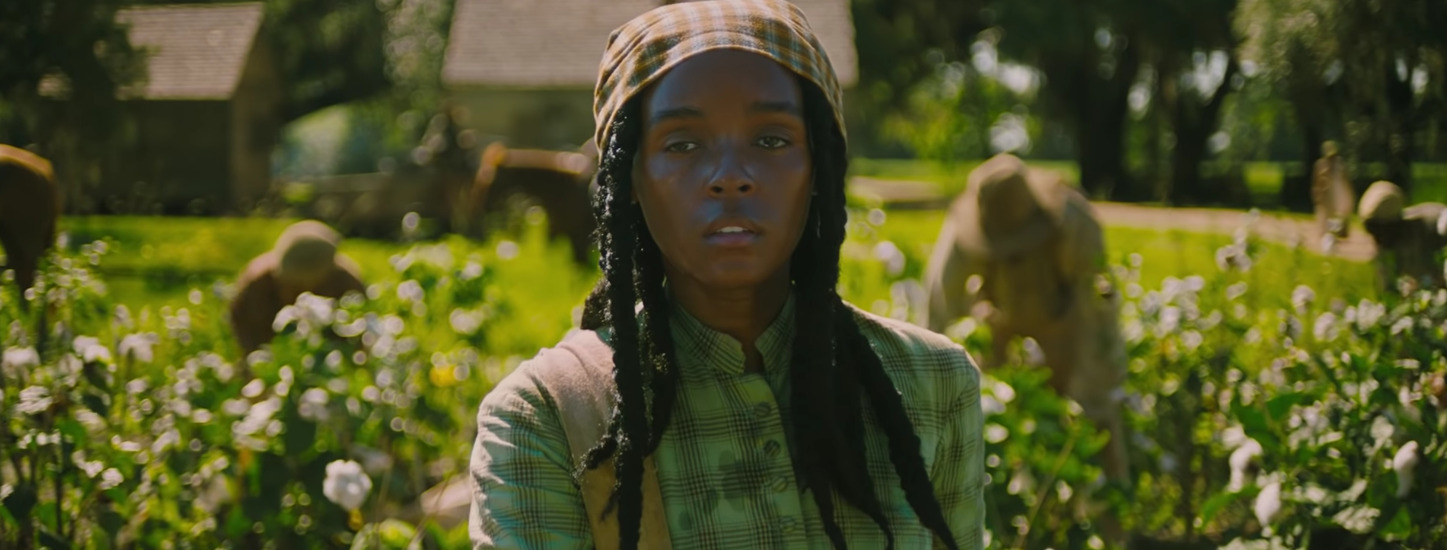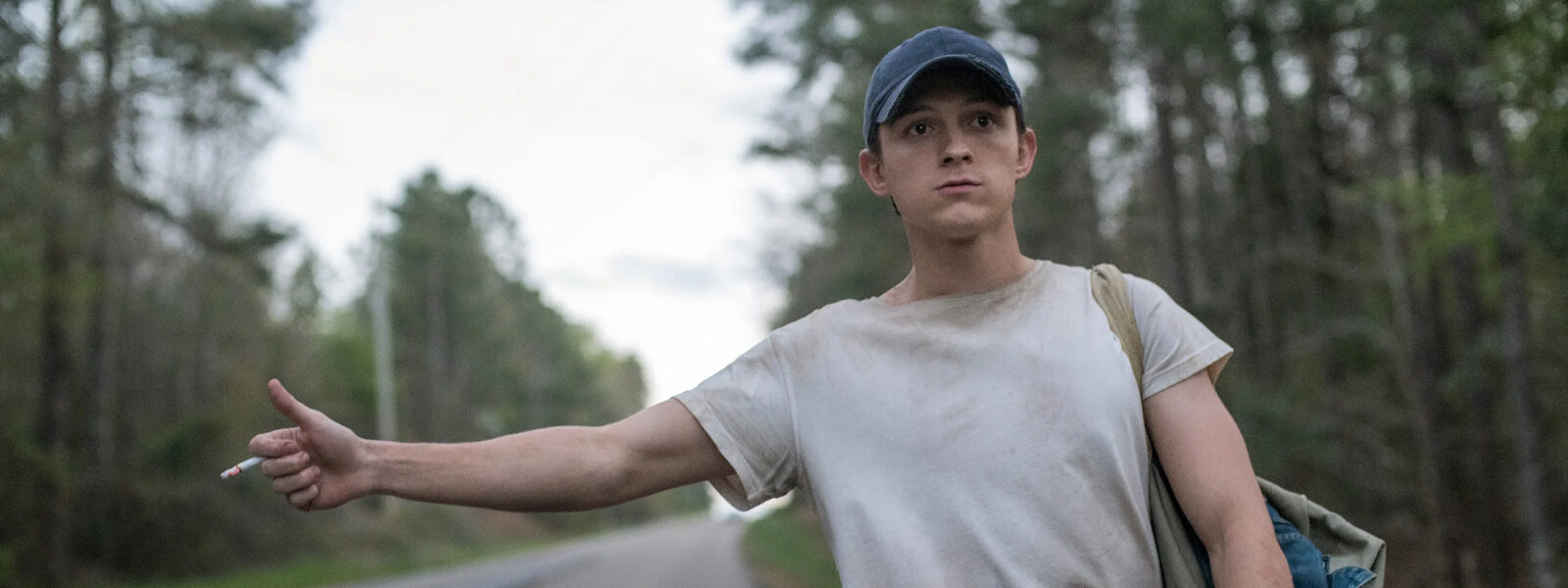Two of the most savagely reviewed films of 2020, ANTEBELLUM and THE DEVIL ALL THE TIME, don’t fare much better over here at Merry-Go-Round.

ANTEBELLUM
Director: Gerard Bush, Christopher Renz
Commercial agency grifters Gerard Bush and Christopher Renz, directors of ANTEBELLUM, the latest in a long con of eyeing social justice as the next great American money-maker, cannot physically or mentally restrain themselves from shooting a plantation with the golden radiance of a sunset behind it, in a showy oner, no less. The copy-and-pasted villages of ASSASSIN’S CREED: ODYSSEY are more robust environments than the overly choreographed actions here, slave laborers more resembling Pirates of the Caribbean animatronics than human beings, and RED DEAD REDEMPTION 2’s stranger encounters more naturally occurring than any person-to-person interaction in this misguided aesthetic super-attraction. It’s difficult not to think of these open-world video games that uncannily simulate reality, since ANTEBELLUM has largely the same narrative and conceptual goals, but via a Shyamalan-indebted twist so fucking dumb that I’d be doing you a disservice by diving into it. If I explained the plot of ANTEBELLUM, I fear that I may actually ruin your day. Imagine an Italian Mondo slavesploitation spin on THE VILLAGE, but unfathomably dull, and you’ll get what makes this pile of shit click.
The interactions are aimlessly rote, with the first 30 minutes communicating what any high school creative writing class could meaningfully condense into six pages: it feels interminably long, but rushes past every beat in a confused blitz, it’s just one of the all-time worst misuses of a runtime. As a whole, the film is 21 minutes of trashy television hanged, drawn, and quartered to 105, but, God, what’s the point of recycling this wretched trope of the slow-drawl, monologue-friendly master brutalizing groveling, weeping human chattel? Is there the thought that somehow you’ll be able to unearth a more evil depiction? ANTEBELLUM exists in an odd ecosystem: the extreme right would lead you to believe slavery wasn’t all that evil, whereas the rest of the right and many centrists, and honestly a good chunk of liberals, would argue that the birth of a nation was long enough ago to minimize. It’s not that the filmic depiction of slavery is inherently reprehensible, in fact we’re learning now that depiction is regrettably becoming more and more necessary, but there’s a deep-seated immorality in banking on these recreations for the sake of cheap thrills. It’s all about intent, and, apologies to all involved, but I’m not exactly keen on the motives of a duo of Miami Beach advertising bimbos walking up to bat with a goddamn 10-pound flounder. I know how these ideas work, because I was once a 20-year-old genre film-obsessive in film school who was hungry to push buttons—locate the exploitation then find the meaning, hastily cobbling together the latter to justify the former. Come on, now: ANTEBELLUM vacations in tedium when it’s not working in ill-conceived ugliness with layovers in corniness.
Janelle Monáe is making a music career off mimicking mid-90s Prince and an acting career off mid-90s agency practices, with the larger career arc of Hattie McDaniels. There’s a severe dissonance of her performative creative expression and her ultimate carried-out overcommitment to one thankless role after another. Is it her team sabotaging her? Is it her? It makes absolutely no sense. It’d be easier to dismiss ANTEBELLUM entirely if it were nothing but shock-jock cinema, but it has a cogent focus, namely about the common United States conservative’s compulsive kink of re-experiencing the country’s prior greatness of evident white supremacy: living in it, tasting it, all by any means necessary. It’s a meaty skeleton for contemporary fiction. There’s also the conference-room-pitch-shallow peppering of white feminism, a sprinkle of historical revisionism, and liberation led by the upper-class; the skills that lead to Monáe’s freedom are the hotel-room Bikram yoga session seen midway and her equestrian riding club experience. That these distinctly out-of-touch activities are never referred to explicitly as such, or not, speaks leagues about the screenplay’s societal blind spots. Interspersed through the end credits, as if Bush and Renz are aware of the wackness and wanting to obscure it, are brief scenes of the folks streaming in to save the day, the real heroes coming to clean up the mess: the Louisiana police and FBI. Fuck off. [Kevin Cookman]

THE DEVIL ALL THE TIME
Director: Antonio Campos
THE DEVIL ALL THE TIME is the kind of movie a lot of us claim to want: very lurid with fairly high levels of moral ambiguity, driven by a cast of talented actors, and not based on an intellectual property originally made for children. It’s more than a little sad that our standards for good cinema have come to this, but it is what it is. And yet, it’s difficult to imagine anyone actually being satisfied with this film. At two-and-a-half hours, THE DEVIL ALL THE TIME wants to be a sweeping, mid-20th century Southern Gothic epic, but it meanders with too many extreme characters whose motivations we cannot understand, let alone empathize with. Having not read the novel the film is based on, I imagine the entire subplot of a woman who helps her husband ritualistically murder hitchhikers is explained a little better, but in the confines of an over-stuffed story, it is downright baffling. The movie ends up feeling like it was originally written to be a season of prestige TV shrunk to a 138-minute film in the end.
And while that may sound like THE DEVIL ALL THE TIME is a total trainwreck, it’s really not. Despite the clear structural flaws and timid direction, there’s some solid acting from a strong cast and moments of provocative, memorable violence. Twitter lit up Robert Pattinson for his absurd performance, but it ends up being one of the most funny and memorable parts of the film; a cartoonish, abusive, flamboyant preacher really would sound pretty weird. Tom Holland gets handed a role seemingly tailor-made for his post Spider-Man career, and despite his character’s arc being utterly ridiculous, he manages to carry it well on his firmly clenched jaw. The scenes of Holland beating the ever-loving piss out of his adopted sister’s bullies are the highlights of the film and some of the best fighting we’re likely to see on screen in this anemic year.
The real heart of the issue with DEVIL seems to be that director Antonio Campos wanted to explore the seedy underbelly of American rural life without actually digging at the forces that cause life in small towns to be so hard. All the pieces are in place: a nakedly corrupt sheriff, a philandering preacher, men who only learn to solve their problems with violence, but there’s no exploration of how the social fabric of small towns upholds these individual bad actors and allows them to get away with what they’ve done. For a movie with so many characters, there’s so little consideration paid to making the towns that feature so prominently in the narrative feel complex and real, no exploration of the political and economic structures that shape life inside the boundaries of these small communities. Aside from occasional references to Vietnam sprinkled in, there’s no commentary on the rapidly transforming social structures of America that drove young people in particular to life-ruining choices. Maybe more of that would’ve given Campos’ film more dimension, but it’s also hard to imagine him tackling these meatier subjects with much finesse. We need more movies like THE DEVIL ALL THE TIME, but we deserve them to be actually good. [Carter Moon]















Comments